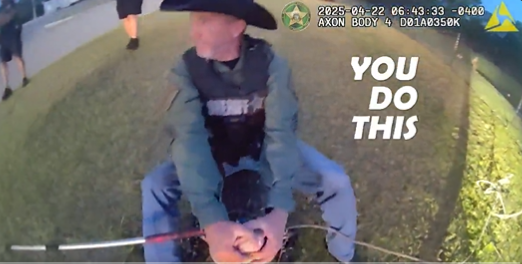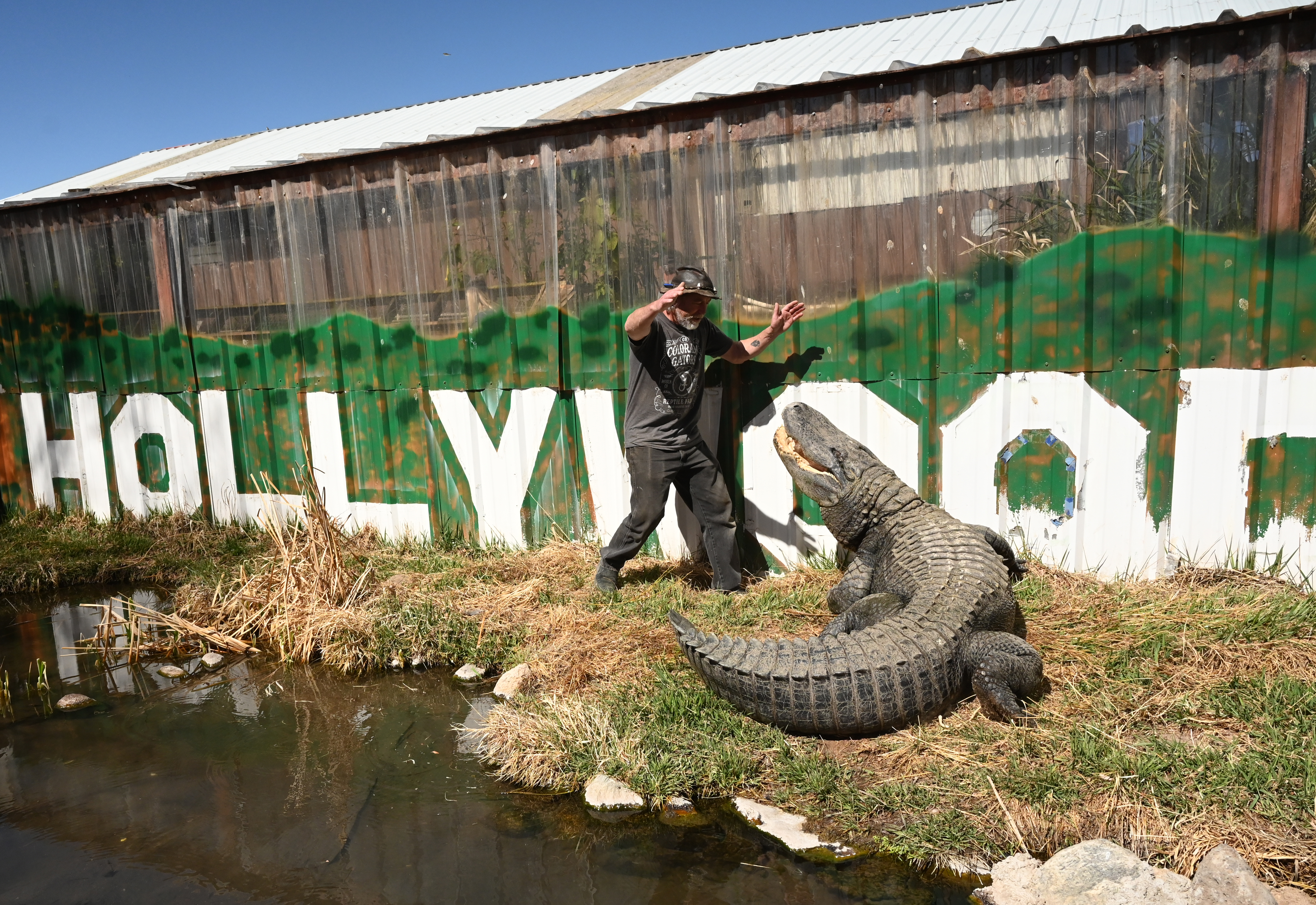Alligator Wrangling Legend: Florida Highway Rescue!
Barefoot ‘Wrangling Legend’ Saves the Day: Florida Police Snag Highway Alligator
Introduction: Only in Florida? You Betcha!
Picture this: You're cruising down the highway, windows down, enjoying the Florida sunshine. Suddenly, you slam on the brakes because there’s a massive alligator chilling in the median. Sounds like a movie scene, right? Nope, just another Tuesday in the Sunshine State. When police in Florida face such "only in Florida" scenarios, they know who to call: A true alligator-wrangling legend.
The Jacksonville Sheriff's Office recently shared a video that’s gone viral, showcasing just such a scene. Imagine seeing a barefoot man wrestling a giant alligator in the middle of the Interstate-95/Interstate-295 highway. It happened! Let's dive into the details of this wild encounter and meet the man who made it all possible.
The I-95 Alligator Adventure: A Highway Hazard
So, how did a large alligator end up causing a traffic jam on one of Florida's busiest highways? Nobody knows for sure, but the important thing is, the Jacksonville Sheriff's Office responded quickly and efficiently. Their first call? To a local expert who knows his way around a reptile or two.
Highway Havoc: Understanding the Risk
An alligator on a highway poses a significant threat. Not only to motorists who might swerve to avoid it, but also to the alligator itself. Imagine being a gator surrounded by roaring cars! Stressful, right?
The Jacksonville Sheriff's Office recognized the urgency of the situation and acted promptly to ensure the safety of both people and the animal. This is where our hero enters the scene.
Enter the ‘Blue Collar Brawler’: A Gator-Wrangling Legend
The video released by the Sheriff's Office features the "Blue Collar Brawler," a local alligator-wrangling legend. This isn't his first rodeo (or should we say, alligator rodeo?). He's known in the community for his fearless approach and expertise in handling these powerful creatures.
Who is the Blue Collar Brawler?
While his real name remains somewhat of a mystery, his reputation precedes him. He’s a seasoned professional with years of experience in safely capturing and relocating alligators. He is the kind of guy you want on your team when you have a gator problem.
Imagine calling a plumber to fix a leaky faucet, but instead, you get a superhero who can not only fix the leak but also build you a whole new bathroom! That's the Blue Collar Brawler for alligators.
Barefoot and Fearless: The Art of Alligator Wrestling
What's truly remarkable about this encounter is that the Blue Collar Brawler was barefoot! Yes, you read that right. No fancy boots, no protective gear, just pure skill and courage. Why barefoot? Well, some wranglers believe it allows for better grip and connection with the ground, enabling quicker reactions.
The Technique: A Symphony of Strength and Strategy
Alligator wrestling isn't just about brute force. It's a carefully choreographed dance that requires understanding the alligator's behavior and anticipating its movements. The Blue Collar Brawler uses a combination of techniques to subdue the alligator, including:
- Distraction: Diverting the alligator's attention.
- Control: Securing the alligator's head and jaws.
- Relocation: Safely moving the alligator to a more suitable environment.
The video shows the alligator lunging at the Blue Collar Brawler, but he skillfully dodges and maneuvers, eventually gaining control of the animal. It's like watching a bullfighter, but instead of a bull, it’s a reptile that’s been around since the dinosaurs!
The Jacksonville Sheriff’s Office: Appreciating the Absurd
The Jacksonville Sheriff's Office's response to the incident has been both professional and humorous. Their social media post perfectly captured the absurdity of the situation, stating, "Just another totally normal day in the Sunshine State."
Social Media Savvy: Making Light of a Heavy Situation
By sharing the video and adding a touch of humor, the Sheriff's Office not only informed the public but also entertained them. This approach helps to humanize law enforcement and build positive relationships with the community.
They turned a potentially stressful situation into a viral sensation, proving that even serious events can have a funny side. Who would have thought an alligator on the highway could bring so much laughter?
Why Florida? Understanding the Gator Population
Florida is home to a large and thriving alligator population. With its warm climate and abundant wetlands, the Sunshine State provides the perfect habitat for these reptiles. But why are they so frequently found in unexpected places like highways?
Habitat Loss and Human Encroachment: A Recipe for Encounters
As Florida's population grows, more and more natural habitats are being developed. This means that alligators are increasingly encountering humans and finding themselves in urban environments.
So, next time you see an alligator in an unusual location, remember that it's likely just trying to find a place to call home. Maybe we should start building alligator condos alongside our highways?
Alligator Safety: What to Do if You Encounter One
While alligator encounters can be amusing to watch on video, it's essential to know how to react if you encounter one in real life. Here are some tips to keep you safe:
- Keep Your Distance: Never approach or attempt to feed an alligator.
- Supervise Children and Pets: Keep a close eye on children and pets near bodies of water.
- Report Nuisance Alligators: If you encounter an alligator that poses a threat, contact your local authorities.
Remember, alligators are wild animals and should be treated with respect. Giving them space is the best way to ensure your safety and theirs. Think of them as grumpy neighbors who prefer to be left alone.
The Future of Alligator Management in Florida
Managing the alligator population in Florida is an ongoing challenge. State and local agencies are constantly working to develop strategies to minimize conflicts between humans and alligators.
Conservation Efforts: Protecting a Vital Species
While alligators can sometimes be a nuisance, they are also an important part of Florida's ecosystem. Conservation efforts are crucial to ensuring their long-term survival.
By protecting their habitats and promoting responsible behavior, we can coexist peacefully with these fascinating creatures. After all, Florida wouldn't be the same without its alligators!
The Viral Impact: Florida's Alligator Fame
The video of the Blue Collar Brawler has gone viral, capturing the attention of people around the world. Why are we so fascinated by stories like this?
The Allure of the Unexpected: Embracing the Unusual
Perhaps it's because these stories remind us that the world is full of surprises. Or maybe it's because we admire the courage and skill of individuals like the Blue Collar Brawler, who are willing to face danger head-on.
Whatever the reason, the viral success of this video demonstrates our collective fascination with the unusual and the extraordinary. It’s a reminder that sometimes, truth really is stranger than fiction.
Beyond the Brawler: Other Florida Wildlife Encounters
While alligators may be the most famous Florida wildlife residents, they're not the only ones. What about bears, snakes, panthers, or even the occasional rogue iguana?
A State of Diverse Ecosystems: Expect the Unexpected
Florida's diverse ecosystems contribute to a rich array of wildlife encounters. Knowing how to respond to them is essential for residents and visitors alike.
Respecting the natural world around us is crucial for peaceful coexistence. After all, we're all sharing the same space.
Alligators in Pop Culture: From Jaws to Gatorland
Alligators have long been a staple of popular culture, appearing in movies, TV shows, and even theme parks. From the terrifying "Jaws" to the family-friendly Gatorland, these creatures have captured our imagination for decades.
Myth vs. Reality: Separating Fact from Fiction
It's important to separate the myths from the realities when it comes to alligators. While they can be dangerous, they are not mindless killing machines.
Educating ourselves about their behavior and respecting their space is key to ensuring our safety and their well-being. Let’s leave the sensationalism to Hollywood!
The Economic Impact of Alligators: Tourism and Conservation
Alligators play a significant role in Florida's economy, both through tourism and conservation efforts. From alligator farms to eco-tourism, these creatures contribute to the state's financial well-being.
A Balancing Act: Promoting Economic Growth and Environmental Protection
Striking a balance between economic growth and environmental protection is crucial for ensuring the long-term sustainability of Florida's alligator population.
By promoting responsible tourism and supporting conservation initiatives, we can continue to benefit from these magnificent creatures while ensuring their survival. It’s a win-win situation for everyone.
The Alligator's Evolutionary History: A Living Fossil
Alligators have been around for millions of years, making them true living fossils. Their evolutionary history is fascinating and provides valuable insights into the development of life on Earth.
Surviving the Ages: Adaptation and Resilience
Alligators have survived countless environmental changes, demonstrating their remarkable ability to adapt and endure.
Their resilience is a testament to their evolutionary success and a reminder of the importance of preserving their habitats. These ancient creatures have much to teach us about survival and adaptation.
Conclusion: A Florida Story for the Ages
The story of the barefoot "Blue Collar Brawler" wrestling an alligator on a Florida highway is a reminder that life is full of unexpected moments. It also underscores the importance of having skilled professionals who can handle challenging situations with courage and expertise. So, the next time you hear a story about an alligator in Florida, remember that it's not just a headline – it's a part of the Sunshine State's unique and unforgettable narrative.
Frequently Asked Questions
1. What should I do if I see an alligator on the road?
If you encounter an alligator on the road, the most important thing is to stay in your vehicle and maintain a safe distance. Do not attempt to approach or interact with the alligator. Contact your local authorities or animal control to report the sighting, and they will handle the situation appropriately.
2. Are alligators dangerous to humans?
Alligators can be dangerous, but attacks on humans are relatively rare. Most alligators are wary of humans and will avoid contact if possible. However, it's important to respect their space and avoid actions that might provoke them, such as feeding them or getting too close.
3. Why are alligators found in urban areas?
Alligators are increasingly found in urban areas due to habitat loss and human encroachment. As Florida's population grows, more natural habitats are being developed, forcing alligators to seek refuge in urban environments. This can lead to more frequent encounters between humans and alligators.
4. How do wildlife experts safely capture alligators?
Wildlife experts use a variety of techniques to safely capture alligators, depending on the size and location of the animal. These methods often involve using specialized equipment, such as snares or catchpoles, to secure the alligator's head and jaws. They prioritize the safety of both the alligator and the people involved in the capture.
5. What happens to alligators after they are captured?
After alligators are captured, they are typically relocated to a more suitable environment, such as a wildlife preserve or alligator farm. The decision of where to relocate the alligator depends on its size, health, and the availability of appropriate habitats. The goal is to ensure the alligator's safety and well-being while minimizing the risk of future conflicts with humans.


